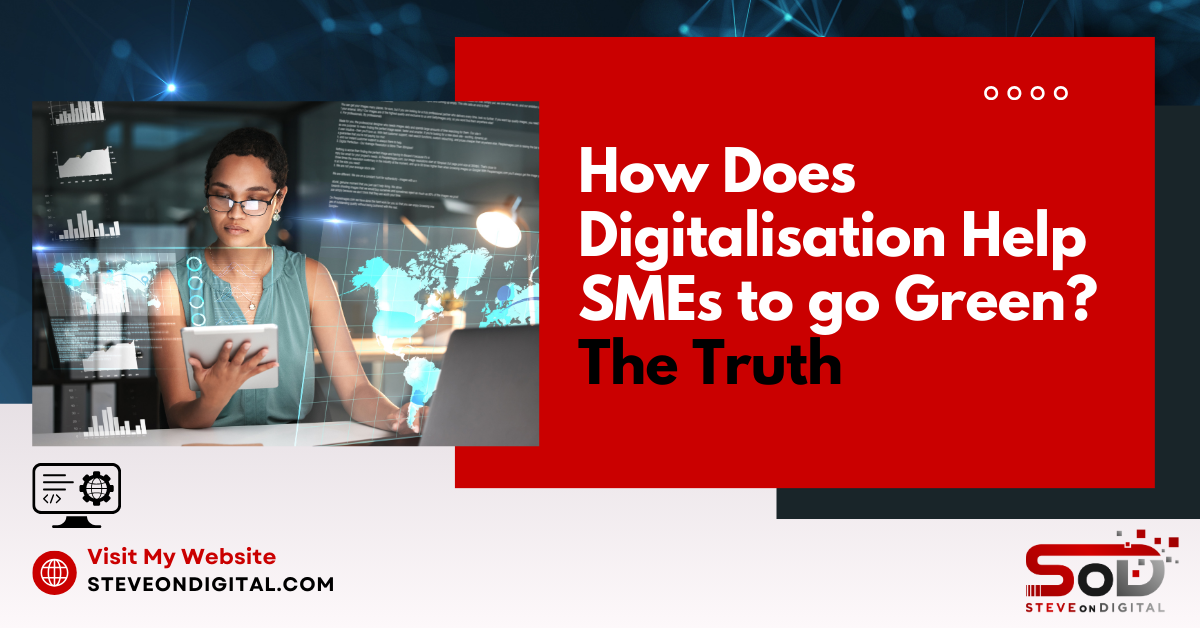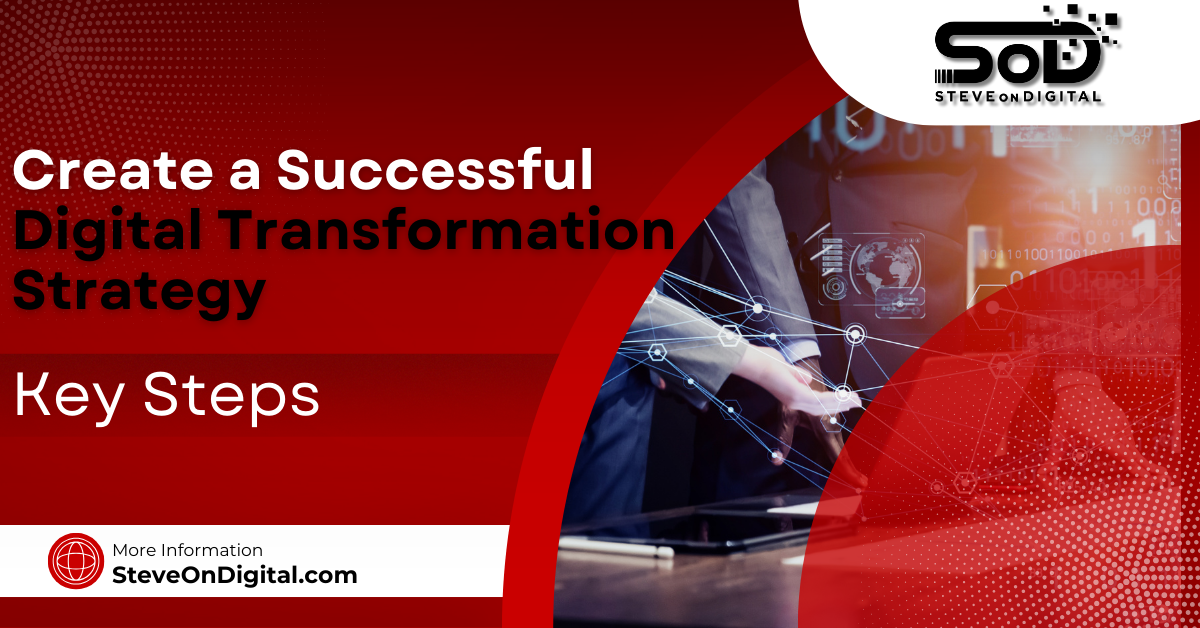Digitalisation helps SMEs go green by increasing efficiency and reducing waste with AI and IoT. This is not just about operational excellence, it’s essential for sustainability in today’s eco conscious market.
As the Digital Transformation Specialist I bring a mix of experience from my electrical engineering background, MBA and MSc in Project Management to help SMEs navigate the digital world.
I help a million business owners and IT directors. I use real life examples to give practical advice.
Beyond professional experience my personal life is about family, continuous learning and community engagement so I connect with entrepreneurs through various online and local platforms.
Digitalisation and Green Transformation
As someone who is in the digital world I’ve seen first hand the impact of digital technologies on small and medium enterprises (SMEs).
This section looks at how digitalisation not only drives SMEs to operational excellence but also to a greener path, essential in today’s eco conscious market.
Sustainable digital transformation is key to explaining how digitalisation helps SMEs go green, so their growth is innovative and environmentally friendly.
What is Digital Transformation in SMEs
Digital transformation in SMEs is integrating digital technology into every area of the business, fundamentally changing how you work and deliver value to customers.
It’s not just about going from analog to digital; it’s about using these tools to make processes more efficient, sustainable and innovatively transform the business model to green innovation.
As I’ve worked with many small businesses, going digital means big improvements in efficiency, sustainability and business model innovation.
Why Green Initiatives Now
The climate crisis is an urgent issue, SMEs need to go green through digitalisation to address the challenges and drive a transformation agenda.
In my experience the pressure to be sustainable is growing.
It’s not just about compliance; it’s a business imperative driven by customer demand and market trends.
Digital tools are key here, to track and manage carbon footprint, energy usage and more.
A recent study found that digital business transformation contributes to economic sustainability and can add significant social value to a business by going green (MDPI).
Digital Technologies for Green SMEs
It’s obvious digital technologies, especially AI are not just tools but catalysts that can trigger a big change in how SMEs approach sustainability, to reduce global CO2 emissions and cleaner production.
Digital Tools And Technologies
Through my work with many SMEs I’ve seen how technologies like AI, IoT and big data analytics are not just buzzwords, they are essential tools that drive big improvements in energy efficiency and waste reduction.
These tools allow for energy usage monitoring and control, smart automation of energy hungry processes and better resource management all of which reduce environmental impact (MDPI).
And the adoption of these digital tools and technologies is key to a sustainable digital economy, highlighting their role in green innovation and enterprise digital transformation.
Real Life Examples And Case Studies
I’ve seen SMEs in real life that have used digital technologies to improve their sustainability.
For example a European study found that SMEs that implemented multiple digital technologies could improve their operational efficiency and environmental footprint (Transatlantic Leadership Network).
These case studies are not only inspiring but also practical examples for other SMEs to go green through digital transformation.
Energy Efficiency Through Innovation
In my work with SteveOnDigital, I’ve seen how digital innovation can reduce energy usage and improve energy efficiency for SMEs.
These are not just about cost savings, they are about a sustainable future.
Smart Technologies Reducing Energy Usage
One of the biggest changes I’ve implemented in SMEs is the integration of smart technologies.
Smart meters and energy management systems are game changers.
They provide real time data on energy usage so businesses can make informed decisions on energy usage.
For example smart meters can identify peak usage times and shift energy use to off-peak, cheaper and lower carbon times.
This saves money and reduces the load on the grid and overall carbon emissions.
| Technology Used | Energy Consumption Before (kWh) | Energy Consumption After (kWh) | Percentage Reduction |
| Smart Meters | 10,000 | 7,000 | 30% |
| Energy Management Systems | 5,000 | 3,500 | 30% |
| Automated HVAC Systems | 8,000 | 5,600 | 30% |
Renewable Energy Solutions
Digital systems are key to integrating renewable energy solutions into existing SME infrastructure.
For example digital platforms can manage the variability of renewable energy sources like solar or wind by balancing them with energy demand in real time.
This is key as it allows SMEs to reduce their reliance on fossil fuels and take control of their energy management.
This is backed by studies that show digital technologies increase renewable energy adoption in SMEs (MDPI) (Transatlantic Leadership Network).
Sustainable Business Models
Digitalisation offers SMEs the chance to rethink and redesign their business models for sustainability.
By integrating digital technologies companies can improve their production process and have more sustainable and efficient operations that contribute to environmental sustainability and better decision making.
Circular Economy
Digital is at the forefront of the circular economy.
By using technologies like blockchain for better traceability or IoT for asset lifecycle management SMEs can improve their sustainability.
These tools create a closed loop system where resources are reused and recycled and waste and environmental impact is minimized.
My experience with small business owners is that those that adopt circular economy principles find new opportunities for innovation and cost savings.
Production Process Re-engineering
Production process re-engineering through digitalisation is another area where I’ve seen environmental and economic benefits.
Digital tools give more control over production lines, reduce material waste and improve overall resource efficiency.
For example AI can predict machine maintenance and prevent breakdowns and extend equipment life and reduce the environmental impact of manufacturing.
Digitalisation And Supply Chain Sustainability
In my work with SteveOnDigital I’ve worked with many small and medium-sized enterprises (SMEs) to transform their supply chains through digitalisation.
This section will look at how digital technologies can streamline operations and sustainability within the supply chains of medium-sized enterprises and the key role of digitalisation in improving the performance and sustainability of SMEs in the global economy.
Supply Chain Management
Digital has changed supply chain management for the better, more efficient and less waste.
Technologies like blockchain and IoT have turned traditional supply chain operations on their head by providing real time tracking and transparency.
For example blockchain provides an immutable record of transactions so products can be traced from source to store.
This is key to verifying product sustainability and reducing counterfeiting and waste.
Transparency And Efficiency
Digitalisation delivers unprecedented levels of transparency and efficiency in supply chains.
With AI and machine learning SMEs can now predict demand better, optimize inventory and reduce over production which is a direct contributor to sustainability.
Plus these tools can quickly identify inefficiencies and adjust operations in real time and reduce energy consumption and resource waste.
Economic Benefits Of Digital Green Strategies
Economic growth is driven by green digital strategies which promote innovation and efficiency in regions that want to be more sustainable.
In the global economy SMEs are key and green digital strategies are key to their sustainability and competitiveness globally.
Going green through digitalisation doesn’t just help the planet, it also helps the profit.
Cost Savings Of Green
From my experience sustainability saves SMEs a lot of money.
Energy efficient technologies and waste reduction systems reduce environmental impact and operational costs.
For example energy management systems monitor and control energy usage and cut energy bills and carbon footprint.
Every penny counts for SMEs.
| Green Practice | Annual Cost Savings ($) | CO2 Emissions Reduced (tonnes) | ROI |
| Waste Reduction | 20,000 | 50 | 150% |
| Energy-Efficient Lighting | 15,000 | 30 | 120% |
| Renewable Energy Sources | 25,000 | 80 | 200% |
Competitive Advantage In The Green Market
Sustainability can be a competitive advantage.
Consumers are now looking for brands that are environmentally responsible.
Digital tools allow SMEs to show off their green credentials through transparent and verifiable metrics to a growing segment of eco conscious customers.
This differentiates from competitors and opens up new markets.
Overcoming The Barriers To Green Digitalisation
As I get into how SMEs can use digitalisation for sustainability it’s clear the benefits are big but so are the obstacles.
These obstacles can even stop the most ambitious small business owners.
Financial And Skills Barriers
Financial constraints and lack of digital skills are the biggest barriers to green digital solutions.
In my work with small business owners, I’ve found initial investment and training costs can be a big hurdle.
But I’ve also seen businesses succeed by accessing local grants and digital literacy programs for SMEs.
It’s about knowing where to look and taking advantage of what’s available.
This reduces the financial burden and builds a digitally literate workforce to manage these new technologies.
Policy And Incentives
Government policy and incentives are key to supporting SMEs in their green digital journey.
For example government led programs offer tax breaks, subsidies and funding for businesses that are sustainable.
These policies reduce the barrier to entry for new technologies and show commitment to a green economy.
Talking to local chambers of commerce and industry associations will give SMEs access to these benefits.
The Future Of Green Digitalisation In SMEs
In the future the green digitalisation landscape will move fast, driven by technology and global sustainability.
The goal of future green digitalisation in SMEs will be to prioritize sustainable development, to promote green innovation and to make these businesses more sustainable across economic, social and environmental dimensions.
Emerging Technologies And Solutions
The future will bring new technologies.
Advanced biodegradable materials, solar glass and AI driven energy efficiency systems are coming.
These will change how small businesses manage their environmental impact and operational efficiency.
Stay informed as early adoption will give a competitive advantage.
More Financial And Governmental Support
Financial and governmental support will expand to provide more robust frameworks for SMEs to adopt green technologies.
Expected to include more financial products for small businesses looking to invest in green technology and more government policies to reduce the carbon footprint of the business sector.
For SMEs this means more opportunities and support if you take the sustainability journey.
Case Studies
In my years of working with small businesses and digital solutions I’ve seen some amazing results.
Here I’ll share stories of SMEs that have implemented digital technologies and green strategies and the real results.
Across Industries
Across manufacturing to services SMEs are using digital to support their sustainability.
For example a small textile business I worked with used IoT sensors to monitor and control water usage during dyeing.
This reduced their water usage by 30% and their chemical waste by 20% proving that sustainability can go hand in hand with business.
And a food processing SME introduced AI driven systems to manage energy consumption which not only saved costs but also reduced their carbon footprint.
Lessons Learned And Best Practices
From these we have learned:
- Early Integration: Integrating digital technologies early in the business planning process will make them more effective.
- Stakeholder Engagement: Successful SMEs engage all stakeholders, employees and customers in their green initiatives to create a sustainability culture.
- Continuous Learning and Adaptation: The digital landscape is changing and so are the opportunities for sustainability. Continuous learning and being open to adapt is key to keeping the green strategies relevant and effective.
Conclusion
Digitalisation can be a game changer for SMEs looking to be more sustainable.
It’s not just about business efficiency, it’s about a sustainable future for our planet.
As I’ve seen through the stories and data I’ve come across it’s clear the journey to sustainability is tough and rewarding.
It requires innovation and a willingness to adopt new technologies that can have a big environmental impact.
The road isn’t always smooth and there are obstacles along the way but the benefits – reduced costs, competitive advantage and most importantly a reduced ecological footprint – are worth it.
So if you’re a small business owner reading this remember: digital technologies in your sustainability journey is not a trend.
It’s a necessity in an increasingly green conscious market.
Continuous adaptation and innovation is key as we move into a greener future.
This article is your one stop shop so you don’t have to look elsewhere for ideas and information on how to make your SME more green through digitalisation.





